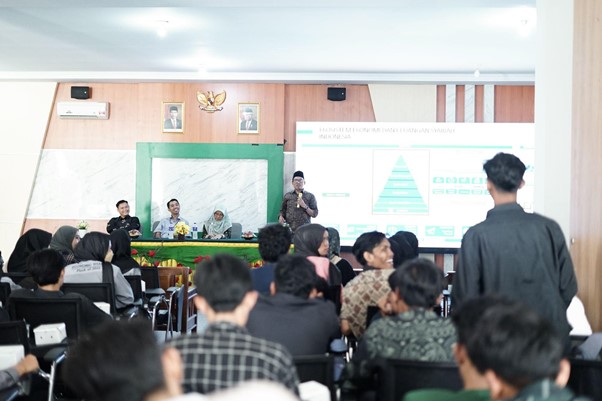LAMPUNG — According to the Ministry of Finance (Kemenkeu) of the Republic of Indonesia, the potential for Islamic economics and finance in Indonesia is enormous. Some of the opportunities as a hub for the development of Islamic economics and finance include the growth of social finance through zakat and waqf. In addition, literacy on the implementation of Islamic economics must also be massively expanded to encourage the growth of Islamic economics.
Through a public lecture to students at the Faculty of Economics and Islamic Business (FEBI) of State Islamic University (UIN) Raden Intan Lampung, on Friday (1/3/2024), Dompet Dhuafa and Permata Bank Syariah’s Zakat and Benevolent Fund Management Unit (UPZDK) explained how the implementation of sharia economy in everyday life. This public lecture was held as a forum for efforts to expand Islamic economic literacy by practitioners.
The public lecture with the theme “Implementation of Sharia Economics in the Present and the Future” was filled by experienced practitioners in the field of Islamic finance. They were Udhi Tri Kurniawan as GM of Economic Empowerment of Dompet Dhuafa, Habibullah as Head of UPZDK Permata Bank Syariah, and Dr Heni Noviarita as Lecturer of FEBI RIL. Also present to give opening remarks, Yogi Achmad Fajar as Branch Manager of Dompet Dhuafa Lampung.
Read also: Dompet Dhuafa and Sakinah Finance Help Improve Islamic Economic Literacy Abroad


As a practitioner in the field of banking zakat collection, Habib believes that the implementation of sharia economy has a great impact on the welfare of society. That is also the reason why UPZDK Permata Bank Syariah collaborates with Dompet Dhuafa as a zakat fund manager. This collaboration was established to manage the company’s zakat funds as capital for the welfare of the poor in the long term.
Therefore, Habib is also very keen to socialise widely about Islamic financial literacy. Not only that, the characteristics of sharia economic principles must also be implemented in society, so that justice and welfare can be realised. That way, in the end, people in their daily lives will get used to behaving in an Islamic manner.
Heni Noviarita in her presentation explained, to get to the implementation of Islamic economics in entrepreneurship, students or people who understand this principle must have creativity and innovation. Creativity to create Islamic financial schemes depends on the substance and what is intended.

According to Heni, the real purpose of implementing Islamic economics is to be implemented in people’s daily lives or behaviour. That is al-adalah and al-maslahah or the economic welfare of society. Then it will be very strong with the support of the khilafah islamiyah. At this point, Heni does not mean the khilafah, which is often misinterpreted as radical leadership, but rather an Islamic government. According to her, it is the caliphate or leadership that is able to make and produce regulations and policies based on Islamic sharia principles.
“The principles of justice in Islamic economics have not been widely applied. Then also as prospective entrepreneurs in the field of Islamic economic perspectives, younger siblings must be able to create a sharia economy creatively and innovatively,” he said.

Likewise, Udhi, who has a lot of experience managing Islamic philanthropy funds, explained that strengthening literacy is a fundamental thing that must be expanded in society. Dompet Dhuafa is constantly trying to ensure that people are aware of Islamic-based finance. This includes the obligation of zakat for those who fulfil the nisab. Then there is also waqf, which has a huge impact on the economic welfare of the community. Furthermore, there are general donations, such as infaq, sadaqah and others, which have become a habit and lifestyle of the Indonesian people.
“To implement this, we try to ensure that empowerment practices in the community truly reflect the principles of a fair Islamic economy. Then of course we collaborate with the campus and with the government, as well as with policy makers,” he explained.
Read also: Dompet Dhuafa Carries CSV Connect 2023, Embraces Shared Economic and Social Environmental Value

Dompet Dhuafa has proven that Islamic philanthropy can alleviate poverty, strengthen the weak, and prosper the disadvantaged. On this occasion, Udhi presented an example of an economic empowerment programme for coffee farmers in Solok, West Sumatra. He also challenged FEBI UIN Raden Intan Lampung students to apply this empowerment scheme to small coffee farmers in Lampung, whose coffee is also well-known in Indonesia.
In addition, Dompet Dhuafa also opens the widest possible collaboration opportunities to anyone in community empowerment efforts. Dompet Dhuafa really wants the Islamic economy, especially in Indonesia, to be implemented, so as to create a just and prosperous society. (Dompet Dhuafa)
Text and Photo: Riza Muthohar
Editor: Dhika Prabowo



